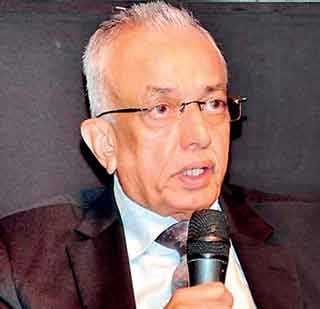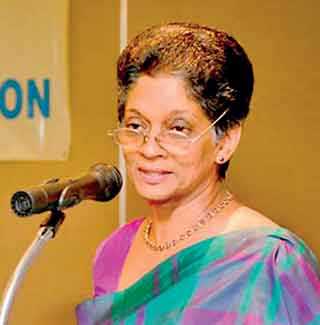Thursday Feb 19, 2026
Thursday Feb 19, 2026
Wednesday, 7 August 2019 00:00 - - {{hitsCtrl.values.hits}}
Opening a new chapter in the exports playbook, the Government of Sri Lanka launched its flagship national agenda – The National Exports Strategy (NES) – in July 2018. The ambitions and outward looking agenda
 |
Development Strategies and International Trade Malik Samarawickarama |
 |
Exports Development Board Chairperson
|
envisions to expand Sri Lanka’s export basket and propel the country to new markets, a side step from the traditional pattern of Sri Lankan exports. The NES, not only expects to expand merchandise exports, but to also expand revenue generated from services.
The NES was designed with a sectoral focus: IT-BPM, Wellness Tourism, Boat Building, Electrical and Electronic Components, Processed Food and Beverages, and Spices and Concentrates. The six focus sectors are supported by four trade support functions: Logistics, Trade Information and Promotion, National Quality Infrastructure, and Innovation and Entrepreneurship. Approaching a year since its launch, how has the NES influenced the Sri Lankan export landscape?
A meeting assembling the core team members of the NES – a technical team initially setup to lead the formulation of the NES – was recently convened and chaired by Minister of Development Strategies and International Trade (MoDSIT) Malik Samarawickarama. Participants included Ministry of Foreign Affairs Secretary Ravinatha Aryasinha, Exports Development Board Chairperson and CE Indira Malwatte, the NES Core Team Members; and, the Chairs of each NES sector Advisory Committee. The meeting was a platform for the Core Team to discuss progress of the NES, and for the Advisory Committee Chairs to present their respective sector progress for the 2018/2019 implementing period, and to escalate any project or policy bottlenecks encountered by the implementing partners.
While Sri Lanka took on a head start for 2018 it had to embrace a more politically volatile fourth quarter, followed by a slower economic recovery phase over the first quarter of 2019. Despite the political/economic turmoil the NES and its Plan of Actions (PoAs) were steered towards implementation through the guidance of Advisory Committees and implementing partners. Spread between six sectors and four trade support functions, the NES has multiple activities to be implemented by over 40 institutions. Since its launch in July 2018, the NES – through its implementation partners – has received implementation support for over 35% of its activities.
While the Exports Development Board is currently spearheading a majority of the activities, a range of other ministries and agencies are also spearheading their respective activities i.e. the Ministry of Industry and Commerce, the Ministry of Science Technology and Research, Ministry of Ports and Shipping and the Ministry of Primary Industries. Despite a constitutional crisis pushing the FY2019 budget approval to April 2019 the NES managed to secure funding for the remaining half of the year. With Rs. 250 million allocated via the National Budget, the NES is armed with projects across its sectors to kick-start the 2019 implementation cycle.
Upon painting the NES broad strokes, the Minister proceeded to invite Advisory Committee Chairs to showcase their key sectoral achievements. Following are some of the key achievements summarised from the sector briefings. Processed Food and Beverages: (1) a budget proposal to establish a National Food Safety and Standards Authority has been approved, implementation will commence over the coming months. Boat Building: (1) a regulatory framework for the boating industry is being developed, (2) development of infrastructure facilities for the sector are ongoing – pre-feasibility study has been completed to establish a breakwater in Kapparathora.
Electrical and Electronics: (1) an MNC Outreach Programme has been designed to connect Sri Lankan electronic companies to MNC supply chains. IT-BPM: (1) the Champion Builder Programme was launched to accelerate the growth of high potential tech companies, (2) a digital country branding exercise – Island of Ingenuity – was executed to increase the industry visibility. Logistics: (1) ongoing dialogue to develop a national logistics and marketing plan along with promotional material, (2) ongoing discussions with the University of Moratuwa and the Department of Census and Statistics to establish a logistics industry focused data gathering and analysis unit. National Quality Infrastructure: (1) a budget proposal to establish a National Quality Council has been approved, implementation will commence over the coming months. Spices and Concentrates: (1) GMP standards have been developed for cinnamon, (2) a brand preposition for Ceylon spices has been developed; a branding strategy for the spice sector is in development. (3) the establishment of the Ceylon Cinnamon Geographical Indication Association. Wellness Tourism: (1) an Online Tourism Business Licensing Service has been established, (2) a special forum organised by EDB to discuss the sector promotion and the way forward – forum was led by wellness sector specialist Stella Photi.
Despite the limited financial resources for implementation during the second half of 2018 and the 2019 budget disbursement delays, the NES has made significant strides across its sectors.
While more political volatility could be expected towards the latter part of the year one variable shall remain persistent – the strong commitment and drive from the private and public implementing partners – this, along with additional support from the Ministry of Development Strategies and International Trade, the Exports Development Board and the National Export Strategy Management Unit will ensure the strategy is effectively operationalised over is operational period of 2018-2022.